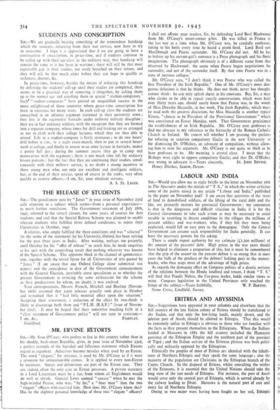STUDENTS AND CONSCRIPTION
Stx,—We are gradually hearing something of the tremendous handicap which the students, returning from their war service, now have to try to overcome. I hope it is appreciated that if we are going to have a continuation of conscription, in peace-time, and if students continue to be called up with their age-class in the ordinary way, that handicap will remain the same as it has been in wartime ; there will still be that most regrettable gap in their studies, not easily breached on their return, and they will still be that much older before they can hope to qualify as architects, doctors, &c.
In peace-time, however, besides the means of reducing this handicap by deferring the students' call-up until their studies are completed, there seems to be a practical way of removing it altogether, by calling them up at the normal age and enrolling them in special "student-companies." Such* " student-companies " have proved an unqualified success in the more enlightened of those countries where peace-time conscription has been in existence for many years. In each call-up class the students are conscribed in an infantry regiment stationed in their university town ; they live in the regimental barracks under ordinary military discipline ; they are in fact ordinary soldiers, with the exception that they are formed into a separate company, whose times for drill and iraining are so arranged as not to clash with their college lectures, which they are thus able to attend. Life in a student-company is fairly strenuous ; to do two hours' drill before 9 a.m., or a night route-march, then to put in several hours' work at college, and finally to return to an army lecture in barracks, makes a pretty full day ; during the summer recess they go to camp and manoeuvres with the regiment ; there is not much time left for ordinary leisure pursuits ; but the fact that they are continuing their studies, simul- taneously with their military service, is no doubt a strong incentive to these young men who, not only are excellent and intelligent soldiers, but, at the end of their service, spent of course in the ranks, very often qualify as reserve officers.—I am, Sir, your obedient servant,
A. S. ST. LEGER.






























 Previous page
Previous page